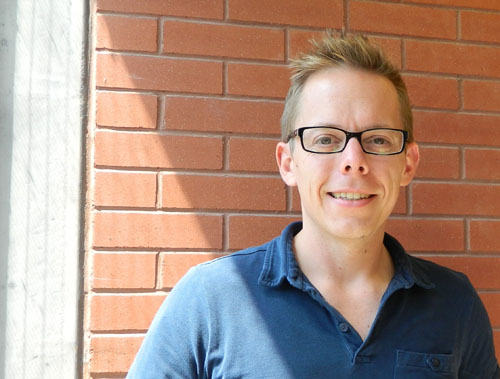
When computer science professor Dan Gillis, was a child, he often couldn’t get to sleep at night because he was doing math problems in his head. In Grade 8, he realized that his teacher was doing a problem incorrectly. After he demonstrated the right approach to the class, she started having him look over new lessons before she taught them.
His love for math was so obvious that when he briefly considered a career in animation, his history teacher insisted that he study math instead.
Gillis did. But despite his love of math, this statistician initially hated statistics. “I did well but didn’t like it.” Only in his second stats course did he find out “why statistics are important and powerful.” Today, he’s found ways to use his mathematical abilities and knowledge to contribute to our understanding of environmental and health issues, something he finds satisfying.
Gillis completed his undergraduate and graduate work at U of G, finishing his PhD in 2010. His research connected him to integrative biology professor Steve Crawford and environmental science professor Neil Rooney, who work with the Saugeen Ojibway First Nations to study the potential effects of various activities on the whitefish living in Lake Huron. Gillis now holds the third faculty position on campus to be sponsored by the Saugeen Ojibway. “They feed the questions that drive my research,” he says.
The whitefish stocks in the lake are an important source of income to the Saugeen Ojibway and also feature in their traditional ways of living. Gillis finds that some of the previously-used statistical models are “a bit simplistic,” so he is developing new models that give a better picture of the numbers of fish and their health.
“There are many things that weren’t considered when the earlier models were developed,” he says. “Human activities can affect fish population, beyond just catching the fish. Waste water contaminants, thermal effects from cooling towers, even companies taking in water from the lake can all affect the numbers of fish. Calculating the effects of each of these factors is the challenge.”
This interest in ecology overlaps with the research Gillis does for the Public Health Agency of Canada on models of disease. That connection began when he was finishing up his master’s degree and considering a PhD; he became interested in research on water-borne illnesses that had taken on a high profile after several people died because of bacteria in the water system of Walkerton, Ont.
“Water-borne diseases are often related to extreme weather,” Gillis explains. “In Walkerton, it was a period of heavy rains that washed the E. coli bacteria into the water system. With climate change, we are expecting to see more extreme weather, so we are looking for ways to mitigate the effects in terms of illness.”
He was involved in one study done in Brazil, where gastro-intestinal diseases are common in communities without running water. “The people in one community were given cisterns to collect rainwater for drinking and cooking. This did reduce gastro-intestinal illnesses but another problem developed: The open cisterns provided a breeding ground for mosquitoes that carried other diseases.” Once people found a way to cover the cisterns, though, this became a simple solution for a serious problem.
Most recently, Gillis has worked with the Public Health Agency of Canada’s population health assessment and scenarios team to analyze possible future scenarios and determine possible responses. Experts in a variety of fields have been brought together to suggest what changes they expect to see in Canada over the next 20 to 50 years and determine potential outcomes in terms of health issues. Government changes and policy changes are also considered.
“For example, most people remember the SARS outbreak in Toronto,” says Gillis. “We might ask: ‘What if there was another disease like SARS, but worse? How would we respond? And how might the kind of government in charge at the time affect the response?’” Yes, it’s a guess, but it’s an informed guess based on the best information available. Businesses use this approach extensively to do their planning, according to Gillis, but it’s a relatively new strategy for the public health agency.
When he’s not calculating whitefish populations or trying to predict the future, Gillis loves to run and bike. He set a goal to run at least one race of a half-marathon length or longer every month and has, so far, kept it up. Later this month, he’ll run a 30k race in Toronto.
He will also be joining his friend and fellow U of G alumnus Rick Chin, B.Sc. ’05 and M.Sc. ’08, who recently won the chance to take on a challenge put forward by Banff Lake Louise Tourism. If they climb three mountains – Mount Temple, Cascade Mountain and Sulphur Mountain – between Aug. 27 and Sept. 4, the tourism group will donate $15,000 to their chosen charity, the Kidney Foundation of Canada. The climbers also have two weeks to fundraise, and Banff Lake Louise Tourism will match whatever they raise up to $5,000. Want to help out? Click here or email Dan at dgillis@uoguelph.ca.